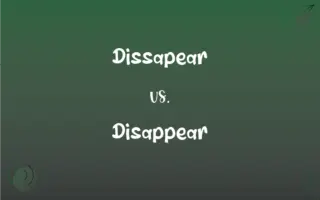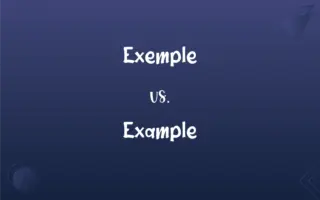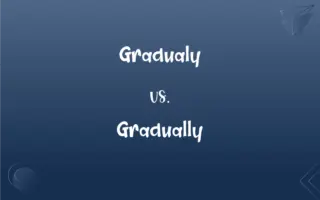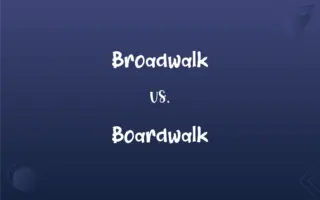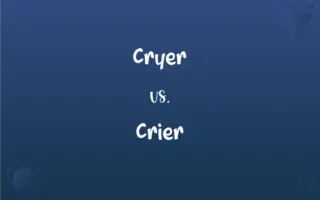Forseeable vs. Foreseeable: Mastering the Correct Spelling
Edited by Aimie Carlson || By Janet White || Updated on March 12, 2024
"Forseeable" is an incorrect spelling; the correct version is "foreseeable." "Foreseeable" means capable of being anticipated or predicted.
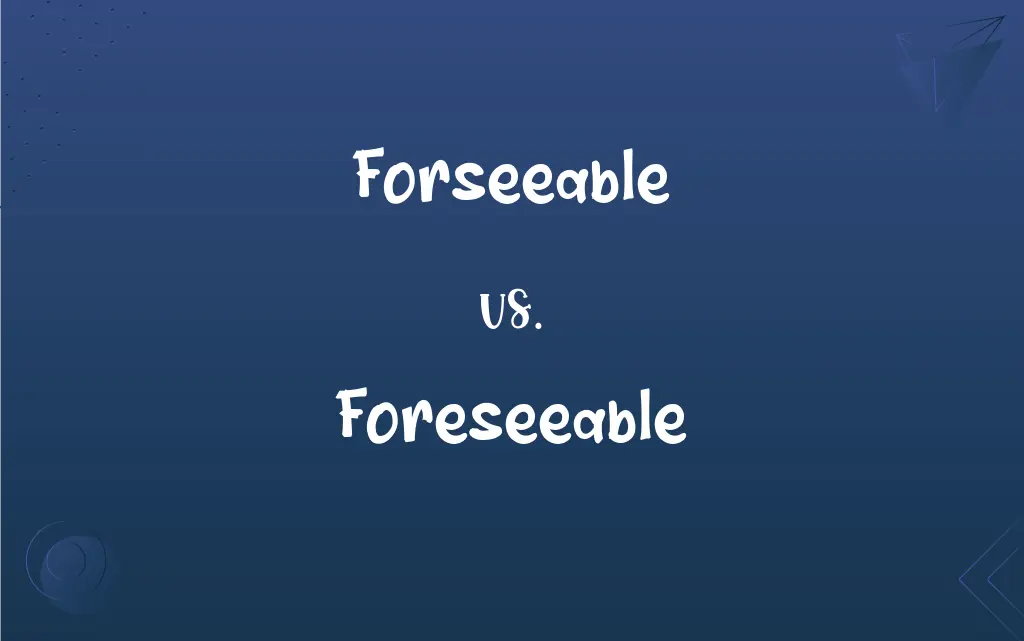
Which is correct: Forseeable or Foreseeable
How to spell Foreseeable?

Forseeable is Incorrect

Foreseeable is Correct
ADVERTISEMENT
Key Differences
Think of "foreseeable" as fore + see + able.
Remember to put "e" twice: once in "fore" and once in "see."
Use flashcards to memorize the correct sequence of vowels.
Associate the word with "able to foresee" to remember the double 'e' in the middle.
Consider the root "foresee" — if you can spell that, you're halfway there.
ADVERTISEMENT
Correct usage of Foreseeable
He plans to stay with the company for the forseeable future.
He plans to stay with the company for the foreseeable future.
The project should be completed within the forseeable future.
The project should be completed within the foreseeable future.
There are many challenges in the forseeable future for the industry.
There are many challenges in the foreseeable future for the industry.
In the forseeable future, technology will continue to evolve.
In the foreseeable future, technology will continue to evolve.
There are no changes expected in the forseeable future.
There are no changes expected in the foreseeable future.
Foreseeable Definitions
Capable of being predicted or anticipated.
We can't go on vacation in the foreseeable future.
To be reasonably anticipated.
The contract is for the foreseeable duration of the project.
Likely to happen or occur.
A raise is not foreseeable at this time.
Expected to occur in a specified timeframe.
The deadline is foreseeable within two weeks.
Predictable based on existing conditions.
The weather will remain stable for the foreseeable future.
To imagine or know as a probable occurrence; anticipate or predict
Foresaw economic decline.
Able to be foreseen or anticipated
This project will not be finished in the foreseeable future.
Being such as may reasonable be anticipated; as, foreseeable costs were well within the budget.
Being such as may reasonable be anticipated;
Foreseeable costs were well within the budget
Foreseeable Sentences
She intends to travel the world in the foreseeable future.
Experts predict steady growth for the foreseeable future.
No major policy changes are expected in the foreseeable future.
The economic outlook appears stable for the foreseeable future.
The technology is expected to dominate the market for the foreseeable future.
For the foreseeable future, the park will remain closed for renovations.
Environmental conservation will be a priority for the foreseeable future.
She sees herself continuing her research for the foreseeable future.
For the foreseeable future, the focus will be on renewable energy.
The strategy will shape the industry for the foreseeable future.
There are significant challenges ahead for the foreseeable future.
We'll continue to work remotely for the foreseeable future.
For the foreseeable future, the trend towards digitalization will continue.
The demand for skilled workers will grow for the foreseeable future.
He's committed to his studies for the foreseeable future.
The policy will affect educational practices for the foreseeable future.
The company is on a solid path for growth in the foreseeable future.
For the foreseeable future, the budget will prioritize health care.
The foreseeable future holds many uncertainties for the economy.
They plan to live abroad for the foreseeable future.
For the foreseeable future, he'll be focusing on his recovery.
The team is set to remain unchanged for the foreseeable future.
She's dedicating herself to philanthropy for the foreseeable future.
Innovations in this field are crucial for the foreseeable future.
They're planning expansions for the foreseeable future.
FAQs
What is the pronunciation of omission?
/oʊˈmɪʃən/
Which vowel is used before omission?
Depends on the preceding word in a sentence.
What is the verb form of omission?
Omit
Is omission an adverb?
No
Which conjunction is used with omission?
"And," "or," "but" can be used.
Why is it called omission?
It's called omission because it refers to the act of leaving something out or not including it.
What is the root word of omission?
The root word is "omit," from Latin "omittere."
What is the plural form of omission?
Omissions
Which article is used with omission?
"The" or "an" depending on context.
Is omission a collective noun?
No
What is the singular form of omission?
Omission
Is the omission term a metaphor?
It can be used metaphorically.
How many syllables are in omission?
3 syllables
What is the first form of omission?
Omission (base form)
Which preposition is used with omission?
"Of," "in," and "by" can be used.
What is the opposite of omission?
Inclusion
Is omission a noun or adjective?
Noun
Is omission a countable noun?
Yes
How do we divide omission into syllables?
O-mis-sion
How is omission used in a sentence?
"The omission of pertinent information was a serious oversight."
What is a stressed syllable in omission?
The second syllable, "mis," is stressed.
What part of speech is omission?
Noun
What is another term for omission?
Exclusion
What is the third form of omission?
There's no third form; it's a noun.
Is omission an abstract noun?
Yes
Is omission a negative or positive word?
Generally neutral, but often used in negative contexts.
Is omission a vowel or consonant?
It's a word, not a vowel or consonant.
Is the word omission imperative?
No
Which determiner is used with omission?
"The," "an," "some," "any" can be used.
What is the second form of omission?
There's no second form; it's a noun.
About Author
Written by
Janet WhiteJanet White has been an esteemed writer and blogger for Difference Wiki. Holding a Master's degree in Science and Medical Journalism from the prestigious Boston University, she has consistently demonstrated her expertise and passion for her field. When she's not immersed in her work, Janet relishes her time exercising, delving into a good book, and cherishing moments with friends and family.
Edited by
Aimie CarlsonAimie Carlson, holding a master's degree in English literature, is a fervent English language enthusiast. She lends her writing talents to Difference Wiki, a prominent website that specializes in comparisons, offering readers insightful analyses that both captivate and inform.
